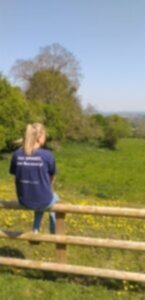
Time To Brew | A Lockdown Campaign
28/04/2020
In the three weeks since lockdown began, an Alcohol Change UK study revealed 1 in 5 of us are drinking more. Kaleidoscope and our partner Barod want you to know that if you, or a loved one, are navigating a changing relationship with alcohol and need support. We're are here to help.

A number of our service users wanted to share their own experiences of lockdown and advice for coping with change, alongside professional harm reduction information and guidance on drinking safely at home. The aim is to help others build resilience and ensure wellbeing if they are relying more on alcohol to cope during COVID-19.
Join the conversation #TimetoBrew
Meet Tim…
Caerphilly resident and father of three Tim Morgan is continuing his recovery and doing well, aided by online meetings, virtual support, at-home workouts and his electric guitar, as lockdown turns daily life on its head.
Tim, 37, had looked forward to starting his voluntary role as a peer mentor with Cyfle Cymru, but just as work was about to begin, the Newport hub was forced to close its doors. Since entering recovery in 2019 Tim has come full circle, and has been alcohol free for 12 months.
Luckily Tim is equipped with many tools for coping with upheaval and building resilience, but in a time of unparalleled change he fears for those more vulnerable, as just one year ago Tim was isolated from family and drinking a bottle of whiskey a day.
Tim, who spent much of his childhood in hospital and made mistakes in an attempt to make up for lost time, said: “When I reached out for help, that face-to-face support, being in a room where I could talk freely and openly to like-minded people, that was a huge step in my recovery. If this outbreak took place a year ago, I’m not sure how I would have coped. That’s why I worry for people choosing to continue in the same vein instead of reaching out at a time like this. For those already struggling with alcohol, I’d be very surprised if they weren’t drinking more during lockdown. Dealing with difficult or new situations can definitely make you reach for the bottle.’’
Drug and alcohol services provided jointly by Barod and Kaleidoscope, in some areas, are receiving just 30% of new alcohol referrals compared with this time last year, since a number of non-clinical bases were forced to close in line with government guidelines.
Tim continued, “I’m lucky to have a solid support network. I FaceTime with two friends from my recovery group every week, along with a weekly virtual recovery meeting with my GDAS keyworker Ross. I’m trying to keep as much structure as I can in my daily life, and whether online or offline, that contact is a really great way of keeping our spirits up, supporting each other and preventing relapse.”
Tim added, “I want people to know support is still available. Yes, service delivery might look a little different, but I’d encourage people to reach out. Everyone is different. And perhaps for some, taking that first step into service by way of a phone call or video chat could feel less overwhelming, less intrusive. There are a number of ways you can reach out on your own terms.’’
Meet Rachel…
Rachel Cook, 44, has volunteered at Kaleidoscope’s Welshpool base for two years, delivering recovery groups and supporting others to overcome the challenges she has faced. Since engaging with services four years ago, has been drug and alcohol free for a year and a half.
Before entering recovery, she was trapped in an abusive relationship and using drugs heavily, isolated from family, friends and the outside world. Rachel is urging people in need of support, to still reach out during the crisis.
She said: “If this outbreak took place when I was at my lowest, I’m not sure how I would have coped. I have got my family’s full support, but those without loved ones around them could be relying more on drugs and alcohol to feel less lonely. Of course over time, this can become a real problem.”
“Help might look a little different during lockdown, but virtual meetings and telephone calls are still a great support. I am still able to access SMART recovery meetings online, the format is the same and I’m benefiting from that routine and structure. The atmosphere is different to when we’re all in a room together, but we’re all doing the best we can to help eachother.”



